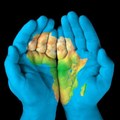#AfricaMonth: Exponential intra-trade growth expected on the continent

The figures prove promising as trade among African countries is projected to hit a 22% increase by 2040, raking in $70bn in additional value.
This was the take-home message of The Money Summit 2022, which took place in Ghana at month's end. Its theme: "Africa's economic growth - facilitating investment, payment and settlement systems".
Facing economic challenges head on
Sponsored by Business & Financial Times, the summit sought to bring together players in the financial sector including banking, payment, insurance, investment banking, fintechs and others, to discuss pertinent financial issues and proffer solutions for the industry.
The keynote speaker at the summit opening, Elsie Addo Awadzi, second deputy governor of the Bank of Ghana highlighted the trade and economic challenges faced by the continent, and PAPPS' role in addressing these head on.
Of great concern are the trade figures coming out from The United Nations Conference on Trade and Development (UNCTAD), which estimate that intra-African trade in 2019 was 15% compared with 68% in Europe and 58% for Asia.
"Fragmented payments' infrastructure, multiple and non-convertible currencies, and over-reliance on correspondent banking, were [and continue to be] some of the factors inhibiting intra African trade, investment and growth," Awadzi said.
As the first centralised payments system infrastructure for processing, clearing, and settling intra-Africa payments, PAPPS (a collaborative effort with Africa's central banks and supported across AfCFTA and the African Union) looks set to shape a more robust economic reality for the region.
Launched in January this year, PAPPS is already making inroads in Africa with eight central banks, six switches and about 25 of the continent's largest commercial banks on board, and it is currently signing very significant strategic relationships with other key institutions.
In a separate report Mike Ogbalu III, chief executive officer of PAPSS said: "We are hopeful that in the next one or two months we can announce that we have grown the network up to 10 central banks. We have signed an agreement with one central bank in the Southern African region; the network is expanding, and we continue to reach out to the other central banks in the continent."
"Intra-regional trade presents a big opportunity for the continent’s economic growth prospects, which must be fully activated," Awadzi said. "The African Continental Free Trade Agreement (AfCFTA) creates for the first time, a single African market for goods and services, that transcends the boundaries of each of the continent’s 54 nations. With trading under the regime having commenced in January 2021, concrete steps need to be taken to expand production, delivery, and payment channels to promote trade, investments, and growth."
PAPPS set to accelerate trade
While AfCFTA is the continent-wide platform that is bringing this vision of a prosperous Africa to fruition, PAPPS is the accelerator.
"With advancements in technology, innovations such as PAPSS - developed and launched by the Afreximbank and the AfCFTA Secretariat - provide great hope for improving intra-regional trade and investment for the region. As a member of the Governing Council of PAPSS, the Bank of Ghana has offered maximum support to the testing and pilot phases of the PAPSS and will continue to do so," Awadzi said.
To this end, she said The Bank of Ghana has commenced a Central Bank Digital Currency (CBDC) pilot which, if successful, should lead to the launch of the eCedi as a central-bank backed digital alternative to physical currency, providing convenience and efficiency in payments, and promoting an inclusive and formalised economy, with significant benefits for Ghana’s economy and the regional economy.
A changing financial ecosystem
But how exactly is PAPPS changing the financial environment across the African continent?
Mike Ogbalu said this is a question he gets asked a lot.
"At the core we've built an instant payment system that has the ability to pay and settle transactions in local currencies. So now we don't need to worry about a transaction that originates in Egypt in Egyptian pounds arriving in Nigeria in Nigerian naira, or how a transaction that originates in SA rands arrives in Kenya in Kenya shillings. The payment and settlement service, provided by central banks, is [extended] to commercial banks and licensed payment service providers across the region that can connect as 'participants'.
"As SWIFT charges and forex costs are removed, intra-African trade is expected to grow exponentially and business transactions for intra-Africa trade and investment will be accelerated.
"We believe PAPPS will fundamentally change trade on the continent."
Ogbalu said he can already see this effect in those countries where this instant payment system has been adopted.
"Already we see a rise in productivity; people don't need to spend days and weeks waiting to confirm payments; they actually get that payment done in less than 120 seconds."
A massive opportunity for fintechs
Beyond the trade element, Ogbalu says there's the excitement of seeing many fintechs creating the solutions that will impact and bring about innovation across Africa's borders.
"Now that we've built that core capability to connect up central banks and large commercial banks on the continent, we will build on that infrastructure a dispute management mechanism, as well as anti-money laundering (AML) and sanction screening. On top of that, we will begin to have fintechs who can provide solutions for the ordinary citizens of the continent.
"We see some fintechs in small countries like Mauritius and Seychelles - countries that have a small population - [now able] to see the entire [population] on the African continent as their market.
"Trade volumes under the AfCFTA will be driven to a large degree, by investments that will help to expand production and processing capacity in key value chains, develop key infrastructure to support the logistics of delivery of goods and services and payments, promote access to efficient and deep financial markets," Ghana Bank's Awadzi said.
"Also critical will be investments in human capital and digitalisation, and the strengthening of business law regimes to promote investor confidence. On its part, the Bank of Ghana will continue to provide strong policy support to promote domestic and regional economic-growth recovery efforts and the drive towards building a more resilient and self-sufficient Africa."
A gateway to the Arab region
But, the future of seamless cross-border trade won't stop here. In a surprise announcement PAPPS this month said it is also building a payment gateway between Africa and the Arab region.
To this end, PAPPS has signed a Memorandum of Understanding (MoU) with Buna - the cross-border payment system owned by the Arab Monetary Fund. It is aimed at enabling financial institutions and central banks in the Arab region and beyond, to send and receive payments, in local currencies as well as key international currencies.
The Arab World and Africa have a long history of trade relations and the PAPSS-Buna partnership will further facilitate the growth of trade between the two regions.
"With its cross-border payment solution, Buna increases opportunities for economic and financial integration in the Arab region and strengthens investment ties with the global trading partners," PAPPS' media statement said.
"This collaboration lays the foundation for the interoperability between PAPSS and Buna payment systems, so that their participants will be able to make fast, secure and affordable transactions in their local currencies between the African continent and the Arab region."
"PAPSS is focused on the impact [of PAPPS on trade in Africa] and not on short-term commercial benefits," Ogbalu said. "Sustaining this impact focus in its collaboration with Buna will have a dramatic impact on trade between Africa and the Arab world.
"This is very exciting."
Related
Former African presidents demand action as debt crisis reaches historic levels 27 Feb 2025 Africa Creatives Alliance launched to harness Africa's creative and cultural sectors 18 Sep 2024 US congress shows strong bipartisan support for Agoa reauthorisation 31 Jul 2024 Cohsasa accredits the Bank Hospital in Ghana 12 Mar 2024 The African Union becomes a permanent member of the G20 11 Sep 2023








